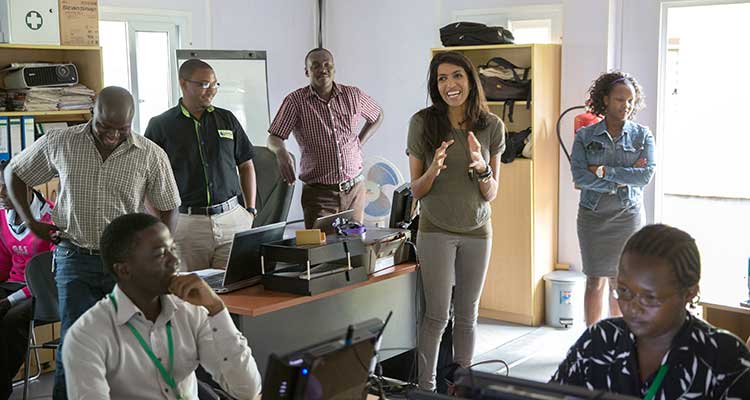The New Nonprofit
Kibera has the dubious distinction of being one of Africa’s largest slums.
Located on the outskirts of Nairobi, Kenya, it is a microcosm of many of the world’s largest crises—poverty, inadequate health care and scarce potable water, to name a few. Most people only see a community in desperate need of help, so they send off a donation.
Leila Janah, however, sees an opportunity for business to make a difference.
The pioneering social entrepreneur is hell-bent on bringing marginalized workers—not just in Kibera, but all around the world—into the workforce through her nonprofit, Samasource. Often called Sama, it connects those living below the poverty line in Kenya, Uganda, India and the United States to dignified work in the digital economy.
But do not be fooled by the organization’s tax status. Ms. Janah’s model is breaking down the typical constructs of charity.
The nine-year-old organization, launched in a Facebook-backed startup accelerator, operates more like an outsourcing agency than a charity. Instead of seeking donations, Ms. Janah and her sales team are after contracts. And so far the organization has scored them with corporate giants—including Google, LinkedIn, eBay and Getty Images—that turn to Sama for help completing digital projects such as image tagging, data verification, and content curation and verification. Sama-trained employees then complete the work from the Sama-owned delivery center or partner centers for a living wage nearly four times what they were previously earning.
Too often, businesses seeking to do good continue to work within the confines of traditional charity. “It’s easier just to set aside a percentage of profit and make a donation and feel like you’ve done your part,” Ms. Janah says. To bring about real change, she says, businesses need to make social impact part of their value chains. Known as impact sourcing, the concept, as coined by Monitor Group and The Rockefeller Foundation, postulates that companies can address world problems through everyday operations.
Companies invest massive amounts of money in their supply chains every day, sourcing materials and labor from other countries, Ms. Janah says. “If that money were directed to low-income people, we could make a big difference in the world.”
Say a retailer needs customer service reps to answer phones. It could find workers anywhere, but if it hires them through Sama, it meets its labor needs while helping battle global poverty.
“It’s easier just to set aside a percentage of profit and make a donation and feel like you’ve done your part.”
“Our vision is to use the digital economy to transform job opportunities for people disconnected from formal jobs because of where they happen to live,” says Ms. Janah, who is a Young Global Leader of the World Economic Forum and was named one of Fortune’s most promising woman entrepreneurs in 2013. The internet allows people to work from anywhere, for virtually anyone, and that reality, she argues, ought to be a powerful force for change.
“Work is the most empowering thing for low-income people,” Ms. Janah told attendees at the Fortune and Time Global Forum in Rome last December. “When we see them as victims and give them handouts in some form or another, we’re really writing off their dignity. We’re not really seeing them as equal participants in the economy. The beautiful model behind giving work is that you’re giving dignity, you’re giving hope and you’re giving a long-term solution to poverty and all of the downstream effects of poverty.”
More Than a Good Deed
While a student at Harvard University, where she received a degree in African development studies and did stints with the World Bank and social entrepreneurship program Ashoka, Ms. Janah became jaded with the traditional model of charity. “Aid and charity are fundamentally paternalistic,” she says. “They deprive people of agency because they assume that we know what’s best for someone who’s low-income, when really the best thing we can do is allow them to have the same choice and freedom that we have when we spend our money on goods and services in the market.”
 The idea for Sama came when Ms. Janah visited extremely impoverished rural areas in India and was blown away by the drive and capabilities of many people she met. In an “aha” kind of moment, Ms. Janah realized these residents were just as adept at fielding customer service calls as a potential employee from a wealthier or more developed area.
The idea for Sama came when Ms. Janah visited extremely impoverished rural areas in India and was blown away by the drive and capabilities of many people she met. In an “aha” kind of moment, Ms. Janah realized these residents were just as adept at fielding customer service calls as a potential employee from a wealthier or more developed area.
Impact sourcing like Sama’s aligns with what people expect from businesses today. Around 80 percent of consumers are more likely to purchase from corporations active in philanthropic efforts year-round as opposed to only in times of need, according to a 2015 survey conducted for Aflac. “Consumers want to support businesses that are transparent and socially conscious Share on X,” Ms. Janah says. “By engaging in impact sourcing, companies can gain consumer loyalty and meet their CSR [corporate social responsibility] goals.”
But companies do not hire Sama simply to do a good deed. “Most of the time it’s just good business,” she says. “Our clients pay nothing for the extra benefit of reducing poverty; they pay what they would have paid a vendor to complete their work. The companies who choose us often do so simply because we deliver high-quality data services.”
After vetting potential workers to make sure they fall within the target impact population and possess basic skills like a strong command of the English language, Sama puts most of its hires through a digital-basics training program. Once agents (as Sama refers to them) are assigned a project, they receive additional training tied to their specific work.
Walking the Walk
Ms. Janah is not just making the case for impact sourcing to the corporate world—she is building it into her own for-profit venture. In 2015 she founded luxury beauty company LXMI (named after Lakshmi, the Hindu goddess of beauty and prosperity), giving a third of her equity in it to Sama and sharing its impact-sourcing goal. The company—pronounced “luxe-me”—provides work for impoverished women in Uganda, where LXMI’s primary product ingredient is sourced from nuts found in the country’s Nile River Valley.
“These women are mostly illiterate and disconnected from computers and electricity,” Ms. Janah says. “So this is kind of an under-one-dollar-a-day population that LXMI may be able to reach. It seemed like a natural extension of our work with Samasource, but in a different category and a really different kind of market.”
 First and foremost, the company is about delivering what beauty consumers are craving—but it could also be a powerful case study for the value of impact sourcing.
First and foremost, the company is about delivering what beauty consumers are craving—but it could also be a powerful case study for the value of impact sourcing.
“It’s about doing what any successful entrepreneur does: creating a product that people want and building in good quality and good customer service and good business practices,” she says. “Our biggest plan is to make sure we have high-quality products that people really want and need. If we do that, then the social impact is kind of icing on the cake.”
At the same time, some shoppers feel they must choose between an effective product and a socially responsible one. LXMI is out to change that perception, aiming for mass-market success through QVC and Sephora.
“I’m really passionate about building a global luxury brand that stands for a deeper vision of luxury,” she says. “Our tagline is ‘beauty for humanity.’ If people are going to pay [a premium] for luxury goods, there should be some social good that’s done in the supply chain.”
A Lasting Impact
While Sama is small compared to the Fortune 500 companies it works with, the waves Ms. Janah and her organization are making are big. “Sama employs over 1,000 people full time now, and we’ve helped 35,000 people move out of poverty. I want to get that number to at least 100,000,” she says.
And the benefits last beyond workers’ time employed through Sama: They more than double their income by their third post-Sama year in the workforce, on average, pushing well above the poverty line. Eighty-four percent of workers continue to work or pursue education after leaving the organization, according to Sama’s research.
Last year Sama hit a major milestone: It became self-funding. Now, Ms. Janah has her sights set on a bigger goal: getting every Fortune 500 company to think about impact sourcing. “Companies are increasingly seeing their supply chains as a real lever for change Share on X,” she says. “They have a responsibility not just to their formal employees, but to anyone who receives payment as part of the value chain.”



